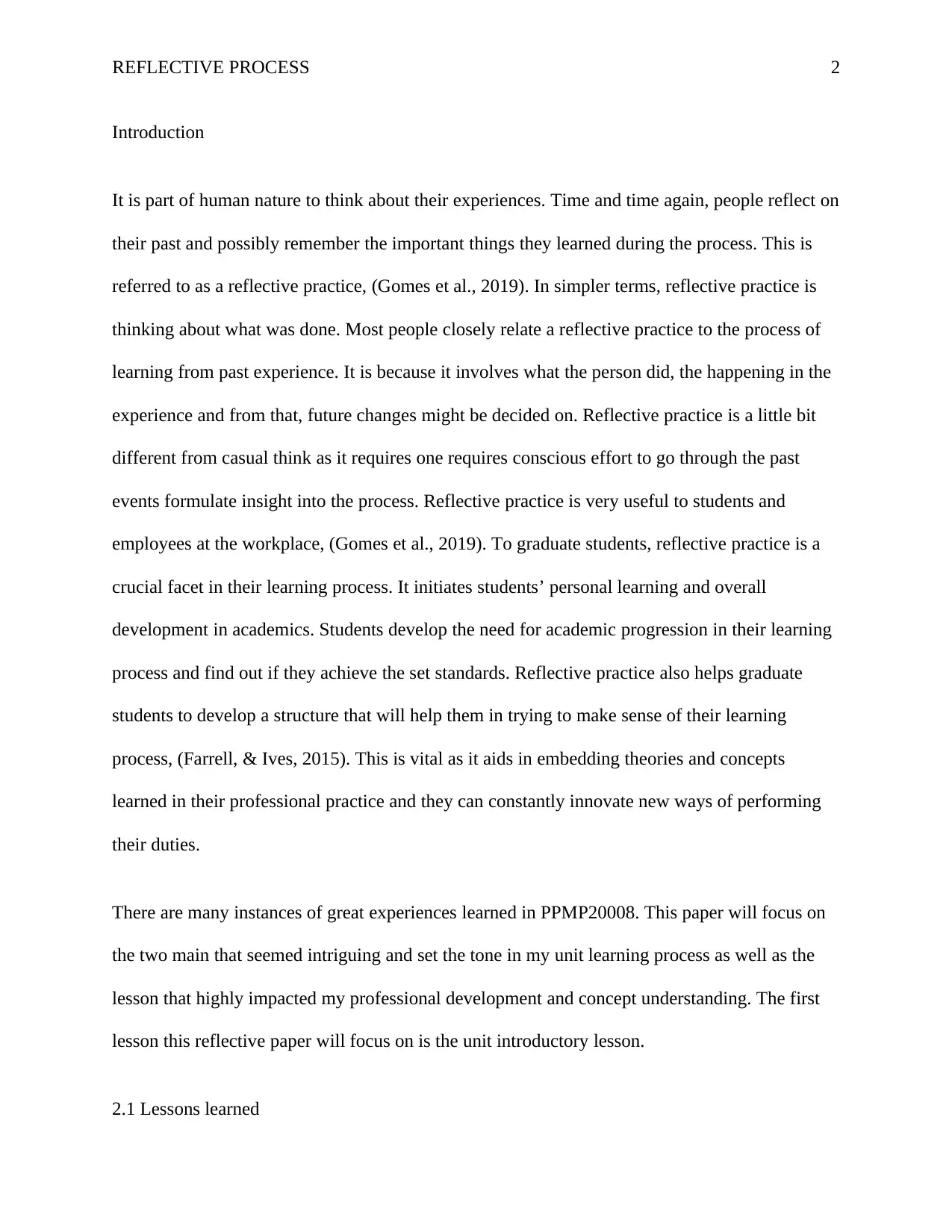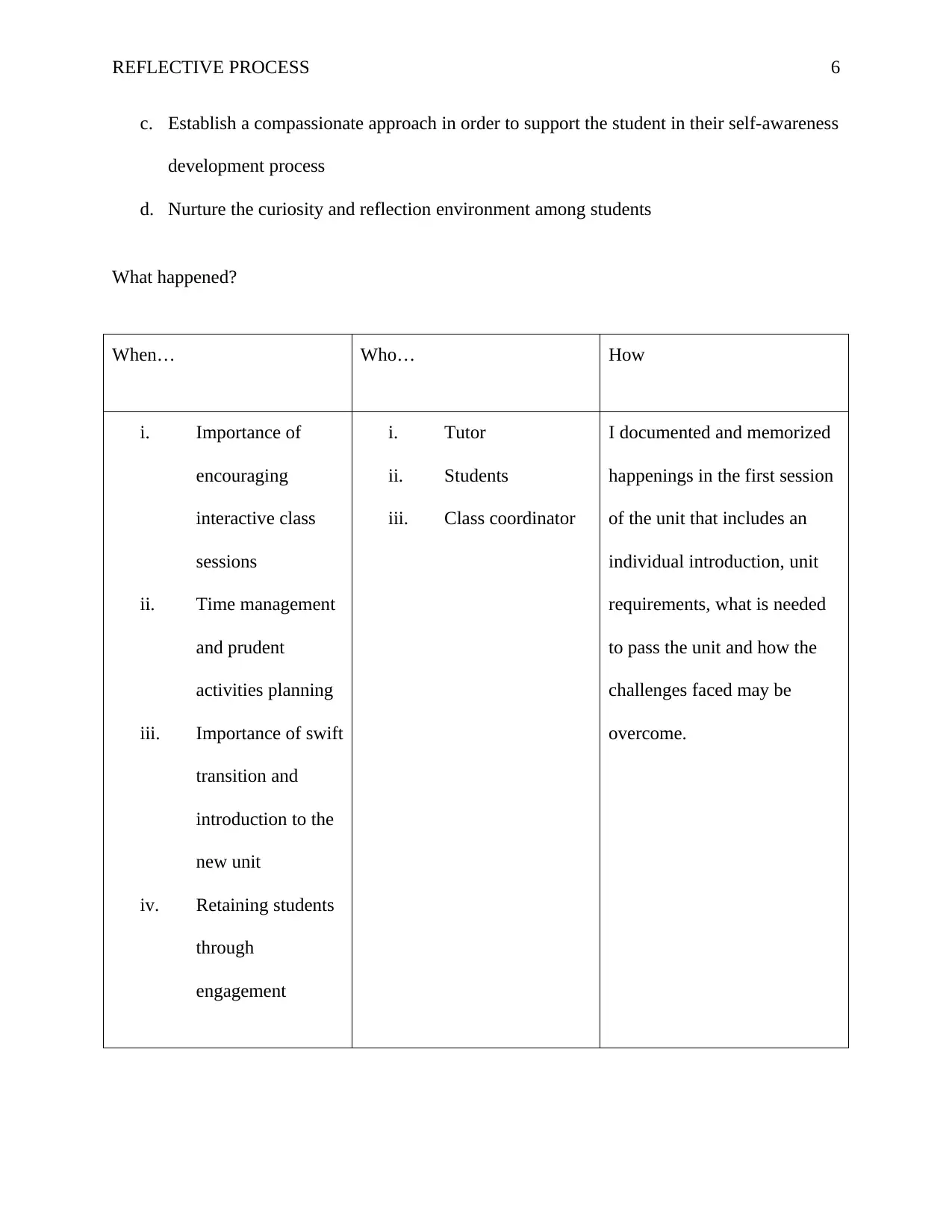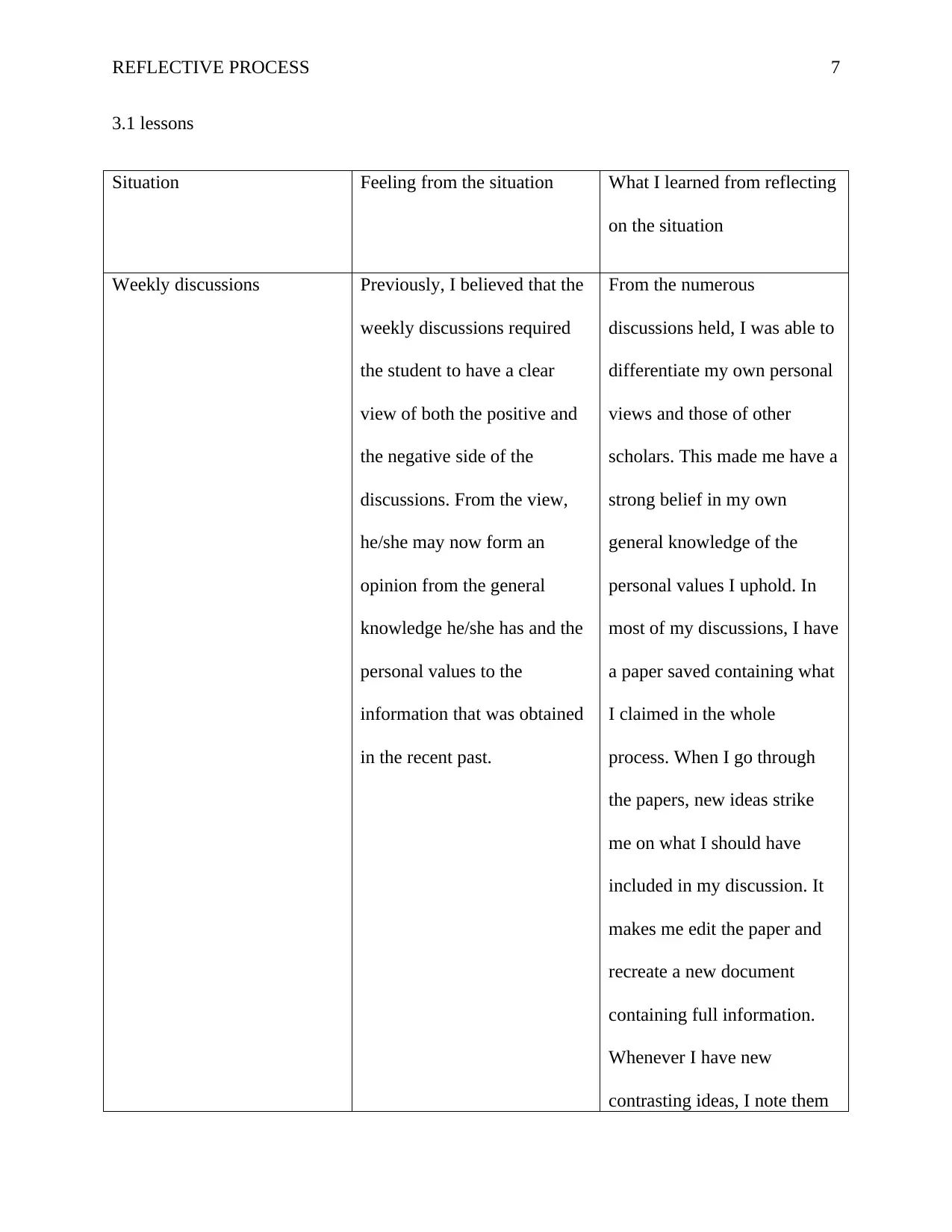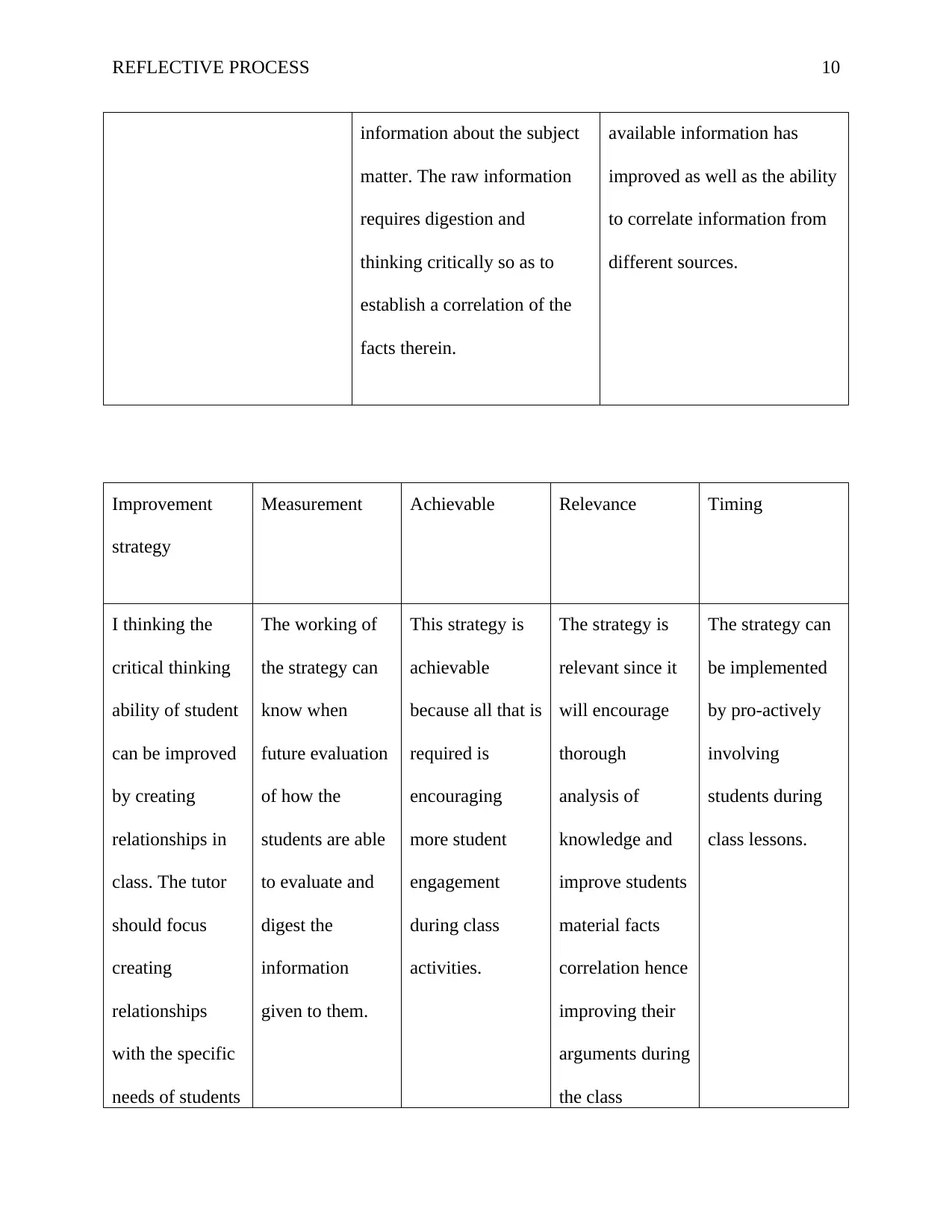PPMP20008: A Reflective Exploration of Lessons for Professional Dev
VerifiedAdded on 2023/03/29
|13
|1841
|228
Report
AI Summary
This report provides a reflective analysis of the student's experience in the PPMP20008 course, focusing on key lessons learned and their impact on professional development. It begins by defining reflective practice and its importance for graduate students, highlighting its role in personal learning and academic progression. The report then delves into two specific lessons: the unit introductory lesson, which emphasized time management and stress management, and weekly discussions, which fostered critical thinking and diverse viewpoints. For each lesson, the student identifies areas for improvement and proposes strategies, measured against SMART attributes (Specific, Measurable, Achievable, Relevant, Timely). The report concludes by stressing the importance of reflective practice in adapting to the dynamic learning process and encouraging active student involvement in classroom activities to facilitate deeper reflection. This document is available on Desklib, a platform offering AI-powered study tools and a wide range of solved assignments for students.

Running Head: REFLECTIVE PROCESS 1
Reflective Process
Student’s Name
Institution
Tutor
Date
Reflective Process
Student’s Name
Institution
Tutor
Date
Paraphrase This Document
Need a fresh take? Get an instant paraphrase of this document with our AI Paraphraser

REFLECTIVE PROCESS 2
Introduction
It is part of human nature to think about their experiences. Time and time again, people reflect on
their past and possibly remember the important things they learned during the process. This is
referred to as a reflective practice, (Gomes et al., 2019). In simpler terms, reflective practice is
thinking about what was done. Most people closely relate a reflective practice to the process of
learning from past experience. It is because it involves what the person did, the happening in the
experience and from that, future changes might be decided on. Reflective practice is a little bit
different from casual think as it requires one requires conscious effort to go through the past
events formulate insight into the process. Reflective practice is very useful to students and
employees at the workplace, (Gomes et al., 2019). To graduate students, reflective practice is a
crucial facet in their learning process. It initiates students’ personal learning and overall
development in academics. Students develop the need for academic progression in their learning
process and find out if they achieve the set standards. Reflective practice also helps graduate
students to develop a structure that will help them in trying to make sense of their learning
process, (Farrell, & Ives, 2015). This is vital as it aids in embedding theories and concepts
learned in their professional practice and they can constantly innovate new ways of performing
their duties.
There are many instances of great experiences learned in PPMP20008. This paper will focus on
the two main that seemed intriguing and set the tone in my unit learning process as well as the
lesson that highly impacted my professional development and concept understanding. The first
lesson this reflective paper will focus on is the unit introductory lesson.
2.1 Lessons learned
Introduction
It is part of human nature to think about their experiences. Time and time again, people reflect on
their past and possibly remember the important things they learned during the process. This is
referred to as a reflective practice, (Gomes et al., 2019). In simpler terms, reflective practice is
thinking about what was done. Most people closely relate a reflective practice to the process of
learning from past experience. It is because it involves what the person did, the happening in the
experience and from that, future changes might be decided on. Reflective practice is a little bit
different from casual think as it requires one requires conscious effort to go through the past
events formulate insight into the process. Reflective practice is very useful to students and
employees at the workplace, (Gomes et al., 2019). To graduate students, reflective practice is a
crucial facet in their learning process. It initiates students’ personal learning and overall
development in academics. Students develop the need for academic progression in their learning
process and find out if they achieve the set standards. Reflective practice also helps graduate
students to develop a structure that will help them in trying to make sense of their learning
process, (Farrell, & Ives, 2015). This is vital as it aids in embedding theories and concepts
learned in their professional practice and they can constantly innovate new ways of performing
their duties.
There are many instances of great experiences learned in PPMP20008. This paper will focus on
the two main that seemed intriguing and set the tone in my unit learning process as well as the
lesson that highly impacted my professional development and concept understanding. The first
lesson this reflective paper will focus on is the unit introductory lesson.
2.1 Lessons learned

REFLECTIVE PROCESS 3
When Who How
i. Class introduction
session
ii. Class contribution
i. Lecturer
ii. Students
iii. Class atmosphere
i. Lecturer
ii. College life
requires numerous
transitions. This
can be one of the
hardest things to do
as a graduate
student
iii. The lecturer taught
me to attach more
importance on time
management, how
to manage class
related stress and
several other things
that may affect my
learning process in
class.
i. Engaging and
retaining students
ii. Encouraging
When Who How
i. Class introduction
session
ii. Class contribution
i. Lecturer
ii. Students
iii. Class atmosphere
i. Lecturer
ii. College life
requires numerous
transitions. This
can be one of the
hardest things to do
as a graduate
student
iii. The lecturer taught
me to attach more
importance on time
management, how
to manage class
related stress and
several other things
that may affect my
learning process in
class.
i. Engaging and
retaining students
ii. Encouraging
⊘ This is a preview!⊘
Do you want full access?
Subscribe today to unlock all pages.

Trusted by 1+ million students worldwide

REFLECTIVE PROCESS 4
proactivity among
students
iii. Availing necessary
resources for
students
In order to successfully and magnificently manage time, it is very important to set goals and
create plans. However, it is apparent that inner motivation is also crucial in sticking with the plan
made. The lecturer was eager to point out the importance of making the goals set to be specific
measurable achievable realistic and timely, (Farrell, & Ives, 2015). It is important to break goals
into smaller measurable goals. This will lead to the systematic and gradual achievement of the
goals reducing the potential of stress. Stress is a natural bodily reaction to demands. It is of two
types, distress or eustress, (Brookfield, 2017). Eustress creates motivation and the urge to
achieve the goals set while distress is a negative form of energy that inhibits one from
performing his activities according to meet the set standards.
Every individual encounters stress. Ways of handling it differ from one individual to another.
Mode of interpreting things is not similar as are the skills that are required to handle the stress.
In the learning process, it is important to know the main causes of stress; academic activities,
social interactions, career decisions, family and financial related causes, (Farrell, & Ives, 2015).
This is coupled with the class environment and the situations that students will be put in while
during the course of the unit study.
proactivity among
students
iii. Availing necessary
resources for
students
In order to successfully and magnificently manage time, it is very important to set goals and
create plans. However, it is apparent that inner motivation is also crucial in sticking with the plan
made. The lecturer was eager to point out the importance of making the goals set to be specific
measurable achievable realistic and timely, (Farrell, & Ives, 2015). It is important to break goals
into smaller measurable goals. This will lead to the systematic and gradual achievement of the
goals reducing the potential of stress. Stress is a natural bodily reaction to demands. It is of two
types, distress or eustress, (Brookfield, 2017). Eustress creates motivation and the urge to
achieve the goals set while distress is a negative form of energy that inhibits one from
performing his activities according to meet the set standards.
Every individual encounters stress. Ways of handling it differ from one individual to another.
Mode of interpreting things is not similar as are the skills that are required to handle the stress.
In the learning process, it is important to know the main causes of stress; academic activities,
social interactions, career decisions, family and financial related causes, (Farrell, & Ives, 2015).
This is coupled with the class environment and the situations that students will be put in while
during the course of the unit study.
Paraphrase This Document
Need a fresh take? Get an instant paraphrase of this document with our AI Paraphraser

REFLECTIVE PROCESS 5
Areas of improvement
Managing stress is a complex issue that requires close attention and varies from an individual to
another. Ways of managing stress incidents among students need to be improved. Hast
recommendations to seek psychiatric services should not be made, (Slovak et al., 2016, May).
Given that graduate class work is no different from the undergraduate they were in, it is
important to recommend basic means of stress management. This may include; creating a relaxed
mood and developing accommodating classroom environment for the student.
Reflection practice is critical for professionals as proof of learning ever taking place.
Professionals learn from the reflections they get on the sessions they were involved. Teaching
and learning processes require students to actively get involved in the inside class activities.
Most of inside classroom discussions lack the uniqueness brought by the unique ability of each
student brings to the classroom environment, (Slovak et al., 2016, May). It is easier to retain
learners and make them engaged in class activities when they are given proper recognition for
their contribution. The first class session is important for achieving this; a professional boundary
guideline should be formed between the tutor and the students. This will prevent a possible
creation of duality kind of relationship. There is a need for the class coordinator to provide the
learners with the necessary resources to keep them engaged, (Brookfield, 2017). This leads to the
molding of great professionals. In order to improve student activity during the learning process,
the following needs to be improved;
a. Create boundaries and healthy communication skills for conflict resolution practices
b. Share learning resources with students in case they need assistance for their reflective
practice.
Areas of improvement
Managing stress is a complex issue that requires close attention and varies from an individual to
another. Ways of managing stress incidents among students need to be improved. Hast
recommendations to seek psychiatric services should not be made, (Slovak et al., 2016, May).
Given that graduate class work is no different from the undergraduate they were in, it is
important to recommend basic means of stress management. This may include; creating a relaxed
mood and developing accommodating classroom environment for the student.
Reflection practice is critical for professionals as proof of learning ever taking place.
Professionals learn from the reflections they get on the sessions they were involved. Teaching
and learning processes require students to actively get involved in the inside class activities.
Most of inside classroom discussions lack the uniqueness brought by the unique ability of each
student brings to the classroom environment, (Slovak et al., 2016, May). It is easier to retain
learners and make them engaged in class activities when they are given proper recognition for
their contribution. The first class session is important for achieving this; a professional boundary
guideline should be formed between the tutor and the students. This will prevent a possible
creation of duality kind of relationship. There is a need for the class coordinator to provide the
learners with the necessary resources to keep them engaged, (Brookfield, 2017). This leads to the
molding of great professionals. In order to improve student activity during the learning process,
the following needs to be improved;
a. Create boundaries and healthy communication skills for conflict resolution practices
b. Share learning resources with students in case they need assistance for their reflective
practice.

REFLECTIVE PROCESS 6
c. Establish a compassionate approach in order to support the student in their self-awareness
development process
d. Nurture the curiosity and reflection environment among students
What happened?
When… Who… How
i. Importance of
encouraging
interactive class
sessions
ii. Time management
and prudent
activities planning
iii. Importance of swift
transition and
introduction to the
new unit
iv. Retaining students
through
engagement
i. Tutor
ii. Students
iii. Class coordinator
I documented and memorized
happenings in the first session
of the unit that includes an
individual introduction, unit
requirements, what is needed
to pass the unit and how the
challenges faced may be
overcome.
c. Establish a compassionate approach in order to support the student in their self-awareness
development process
d. Nurture the curiosity and reflection environment among students
What happened?
When… Who… How
i. Importance of
encouraging
interactive class
sessions
ii. Time management
and prudent
activities planning
iii. Importance of swift
transition and
introduction to the
new unit
iv. Retaining students
through
engagement
i. Tutor
ii. Students
iii. Class coordinator
I documented and memorized
happenings in the first session
of the unit that includes an
individual introduction, unit
requirements, what is needed
to pass the unit and how the
challenges faced may be
overcome.
⊘ This is a preview!⊘
Do you want full access?
Subscribe today to unlock all pages.

Trusted by 1+ million students worldwide

REFLECTIVE PROCESS 7
3.1 lessons
Situation Feeling from the situation What I learned from reflecting
on the situation
Weekly discussions Previously, I believed that the
weekly discussions required
the student to have a clear
view of both the positive and
the negative side of the
discussions. From the view,
he/she may now form an
opinion from the general
knowledge he/she has and the
personal values to the
information that was obtained
in the recent past.
From the numerous
discussions held, I was able to
differentiate my own personal
views and those of other
scholars. This made me have a
strong belief in my own
general knowledge of the
personal values I uphold. In
most of my discussions, I have
a paper saved containing what
I claimed in the whole
process. When I go through
the papers, new ideas strike
me on what I should have
included in my discussion. It
makes me edit the paper and
recreate a new document
containing full information.
Whenever I have new
contrasting ideas, I note them
3.1 lessons
Situation Feeling from the situation What I learned from reflecting
on the situation
Weekly discussions Previously, I believed that the
weekly discussions required
the student to have a clear
view of both the positive and
the negative side of the
discussions. From the view,
he/she may now form an
opinion from the general
knowledge he/she has and the
personal values to the
information that was obtained
in the recent past.
From the numerous
discussions held, I was able to
differentiate my own personal
views and those of other
scholars. This made me have a
strong belief in my own
general knowledge of the
personal values I uphold. In
most of my discussions, I have
a paper saved containing what
I claimed in the whole
process. When I go through
the papers, new ideas strike
me on what I should have
included in my discussion. It
makes me edit the paper and
recreate a new document
containing full information.
Whenever I have new
contrasting ideas, I note them
Paraphrase This Document
Need a fresh take? Get an instant paraphrase of this document with our AI Paraphraser

REFLECTIVE PROCESS 8
down on another copy. When
reflecting back, I compare the
two copies.
3.1.1 Improvement strategy
Improvement
strategy
Measurement Achievable Relevant Timing
Discussions are
important to
students. It
impacts greatly
on how well the
students
understand a
given topic in
class. It provides
an avenue for
how several
viewpoints can
be used in
addressing a
particular point
Assigning every
individual an
area to cover in
the discussion.
This can be
measured by
analyzing the
dept. of the
information
obtained after the
discussion and
the degree at
which the subject
matter has been
Graduate classes
do not contain a
large number of
students. It will
be prudent to
offer each
student a
subsection to
cover in the
discussion.
This strategy will
be relevant to the
class discussion
activities since it
will offer the
lecturer an inept
opportunity to
find out how
each student
understood the
subject matter.
The strategy can
be utilized at any
given time a
discussion is
being conducted.
This can be
treated as the
norm of the
weekly
discussions.
down on another copy. When
reflecting back, I compare the
two copies.
3.1.1 Improvement strategy
Improvement
strategy
Measurement Achievable Relevant Timing
Discussions are
important to
students. It
impacts greatly
on how well the
students
understand a
given topic in
class. It provides
an avenue for
how several
viewpoints can
be used in
addressing a
particular point
Assigning every
individual an
area to cover in
the discussion.
This can be
measured by
analyzing the
dept. of the
information
obtained after the
discussion and
the degree at
which the subject
matter has been
Graduate classes
do not contain a
large number of
students. It will
be prudent to
offer each
student a
subsection to
cover in the
discussion.
This strategy will
be relevant to the
class discussion
activities since it
will offer the
lecturer an inept
opportunity to
find out how
each student
understood the
subject matter.
The strategy can
be utilized at any
given time a
discussion is
being conducted.
This can be
treated as the
norm of the
weekly
discussions.

REFLECTIVE PROCESS 9
of discussion. To
improve this,
there is a need to
make the
discussion as
objective as
possible. Every
member should
be given an
opportunity to
express their
views during the
discussion
covered.
Situation Feeling from the situation What I learned from reflecting
on the situation
Critical thinking Most of the weekly
discussions made me read
publications and scholarly
articles that contained
After carrying out these
processes, my critical thinking
ability has greatly improved.
My ability to analyze the
of discussion. To
improve this,
there is a need to
make the
discussion as
objective as
possible. Every
member should
be given an
opportunity to
express their
views during the
discussion
covered.
Situation Feeling from the situation What I learned from reflecting
on the situation
Critical thinking Most of the weekly
discussions made me read
publications and scholarly
articles that contained
After carrying out these
processes, my critical thinking
ability has greatly improved.
My ability to analyze the
⊘ This is a preview!⊘
Do you want full access?
Subscribe today to unlock all pages.

Trusted by 1+ million students worldwide

REFLECTIVE PROCESS 10
information about the subject
matter. The raw information
requires digestion and
thinking critically so as to
establish a correlation of the
facts therein.
available information has
improved as well as the ability
to correlate information from
different sources.
Improvement
strategy
Measurement Achievable Relevance Timing
I thinking the
critical thinking
ability of student
can be improved
by creating
relationships in
class. The tutor
should focus
creating
relationships
with the specific
needs of students
The working of
the strategy can
know when
future evaluation
of how the
students are able
to evaluate and
digest the
information
given to them.
This strategy is
achievable
because all that is
required is
encouraging
more student
engagement
during class
activities.
The strategy is
relevant since it
will encourage
thorough
analysis of
knowledge and
improve students
material facts
correlation hence
improving their
arguments during
the class
The strategy can
be implemented
by pro-actively
involving
students during
class lessons.
information about the subject
matter. The raw information
requires digestion and
thinking critically so as to
establish a correlation of the
facts therein.
available information has
improved as well as the ability
to correlate information from
different sources.
Improvement
strategy
Measurement Achievable Relevance Timing
I thinking the
critical thinking
ability of student
can be improved
by creating
relationships in
class. The tutor
should focus
creating
relationships
with the specific
needs of students
The working of
the strategy can
know when
future evaluation
of how the
students are able
to evaluate and
digest the
information
given to them.
This strategy is
achievable
because all that is
required is
encouraging
more student
engagement
during class
activities.
The strategy is
relevant since it
will encourage
thorough
analysis of
knowledge and
improve students
material facts
correlation hence
improving their
arguments during
the class
The strategy can
be implemented
by pro-actively
involving
students during
class lessons.
Paraphrase This Document
Need a fresh take? Get an instant paraphrase of this document with our AI Paraphraser

REFLECTIVE PROCESS 11
whose outcome
is measurable
and the goals set
should not be
over ambitious
but attainable
given time
factor. This can
be achieved by
engaging
members of the
class in
contributing to
the topic of the
day and
promoting
information
inquiries by the
student on a
given topic
discussions
Conclusion
whose outcome
is measurable
and the goals set
should not be
over ambitious
but attainable
given time
factor. This can
be achieved by
engaging
members of the
class in
contributing to
the topic of the
day and
promoting
information
inquiries by the
student on a
given topic
discussions
Conclusion

REFLECTIVE PROCESS 12
The dynamic demands and responsibilities on students’ need them to reflect on the various
lessons so as they can have an appropriate response to the dynamic learning process. The
reflective process requires a student to question their behavior and actions and change as a result,
(Brookfield, 2017). Class environment and the encouragement for students to get involved in
class activities is important in order to enable them to have a lot to ponder during reflection.
Students’ questioning of their ability will significantly help them in grasping the theories and
concepts of the class unit.
The dynamic demands and responsibilities on students’ need them to reflect on the various
lessons so as they can have an appropriate response to the dynamic learning process. The
reflective process requires a student to question their behavior and actions and change as a result,
(Brookfield, 2017). Class environment and the encouragement for students to get involved in
class activities is important in order to enable them to have a lot to ponder during reflection.
Students’ questioning of their ability will significantly help them in grasping the theories and
concepts of the class unit.
⊘ This is a preview!⊘
Do you want full access?
Subscribe today to unlock all pages.

Trusted by 1+ million students worldwide
1 out of 13
Related Documents
Your All-in-One AI-Powered Toolkit for Academic Success.
+13062052269
info@desklib.com
Available 24*7 on WhatsApp / Email
![[object Object]](/_next/static/media/star-bottom.7253800d.svg)
Unlock your academic potential
Copyright © 2020–2026 A2Z Services. All Rights Reserved. Developed and managed by ZUCOL.



